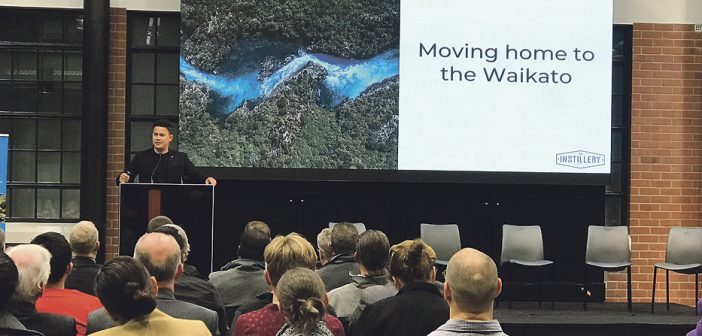Waikato is the region of opportunity when it comes to tech. It has been New Zealand’s fastest growing tech area for the past two years, and exporting is a particular strength.
Company-X co-founder David Hallett highlighted the opportunities during a Grow Waikato forum in July.
They exist partly because the sector has ground to make up. Waikato’s tech sector comprises 6 percent of regional GDP, below the New Zealand average of 8 percent.
Meanwhile, tech makes up 4 percent of employment in the region, also lagging the larger regions.
Matching the national average would see more than 2000 jobs created and $350 million added to GDP, currently around $1.5 billion.
Hallett highlighted exporting, an area where Waikato punches above its weight with a 7.7 percent share of tech exports.
“The best way to grow is to export. Trade surplus is a really good thing because it means the market’s no longer constrained,” said Hallett, one of four speakers on digital technology at the event.
“When you’re exporting and have great international vision it means you’re paying your taxes with foreign dollars. That’s a really really cool place to be, and it helps us grow our country,” he said. “That’s what the tech industry enables us to do.”
A government initiative, Growing Innovative Industries in New Zealand, released earlier in the day, earmarked digital technology as one of its four industry transformation plans.
Hallett welcomed its reference to supporting growth in the ICT export industry, along with its mention of a level playing field for New Zealand firms to compete for government business.
“The procurement process in New Zealand is horribly broken so obviously they ‘re going to have a look at this.”
Hallett was joined by CultivateIT operations manager Jannat Maqbool, Instillery director Mike Jenkins and South Waikato economic development manager Paul Bowden at the Grow Waikato forum organised by Labour MP Jamie Strange and held at Wintec’s Atrium.
Maqbool outlined CultivateIT’s involvement in Waikato events in its role as a connector, and Jenkins, who is on the NZTech board, gave a background to his company’s rapid growth as a cloud enabler.
That was helped by the “epic young talent” in Waikato coming out of the tertiary providers, he said.
It’s the kind of young talent Bowden wants to see in his district, aided by a proposed digital development hub in Tokoroa. The hub, which is likely to require PGF funding, will include a space for developing young people’s digital skills, support for startups and a co-working space.
“It’s designed to be at the heart of the community, at the heart of everything we’re trying to do in the South Waikato,” Bowden said.
He described the growth of IT as central to the district’s traditional primary industries base, including dairy farming and forestry.
“The forestry sector will be operating remote drones, it will be operating remote cutting devices, autonomous vehicles will be taking the logs to ports, so they as industries need IT skills,” he said.
“What we’re trying to do is not just about the future businesses, startups and entrepreneurs, it’s also about supporting existing businesses that we’ve got to make them even more successful, and to create great opportunities to reduce digital disadvantage and inequality in South Waikato.”
Hallett welcomed the planned Tokoroa hub as part of the way forward.
“What they are talking about in South Waikato is really important to assist people and help them go through those formative stages of building a company.”
In future, he also wanted to see more companies in the AI space, “playing with robotics, virtual reality, augmented reality. These are the areas where you can achieve amazing things.”
The time was ripe for disruption of existing methods. “If we look at the way we do things and apply automation and some of these ideas we can achieve some really cool businesses and have global potential.”
Startup seed capital was important, as was a regulatory environment suited to rapid growth businesses.
“It would be great to see a lot more joint ventures between tech companies or tech entrepreneurs and existing companies to leverage their IP.
“My big one, which is really important – CultivateIT is really enabling this – is the fostering of inter-company collaboration, businesses that traditionally compete, fostering that relationship so they can work together. If we work together for the economic benefit of our regions, of our country, that’s the win for all of us.”
• NZTech chief executive Graeme Muller says there are nearly 21,000 firms in the New Zealand tech sector, collectively investing $580 million in research and development, 35 percent of all R and D in the country. Tech employs more than 108,000 people and contributes to nine percent of New Zealand’s total exports.




